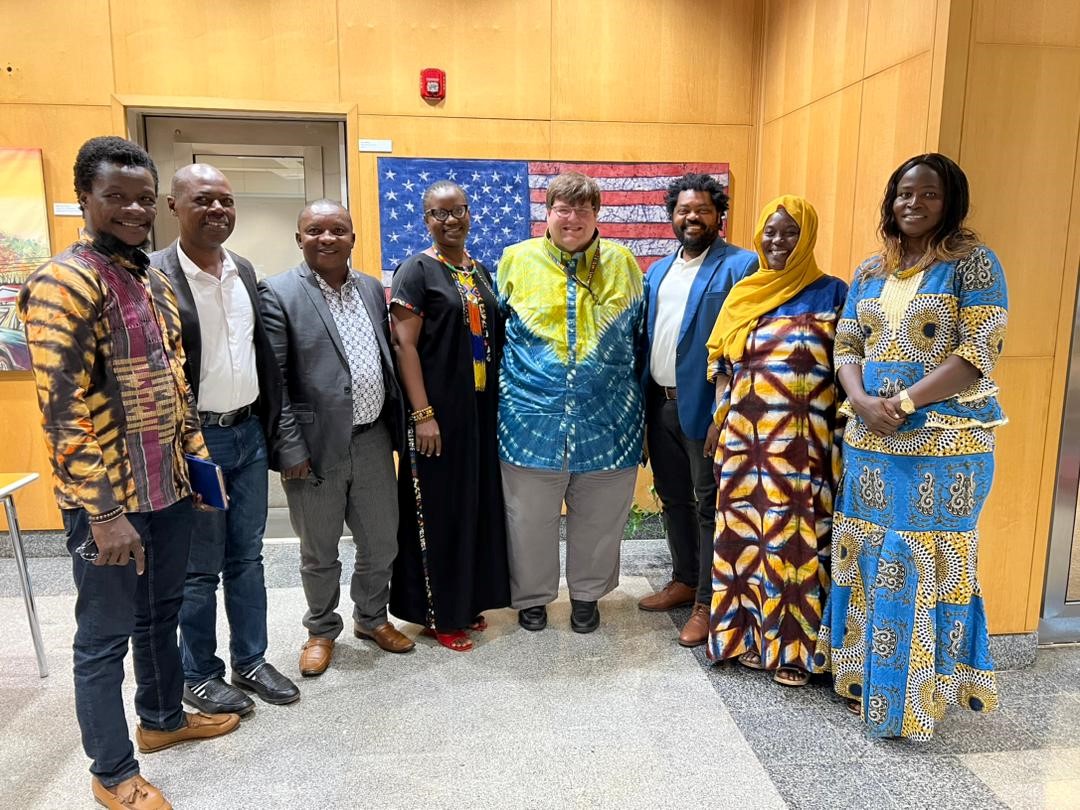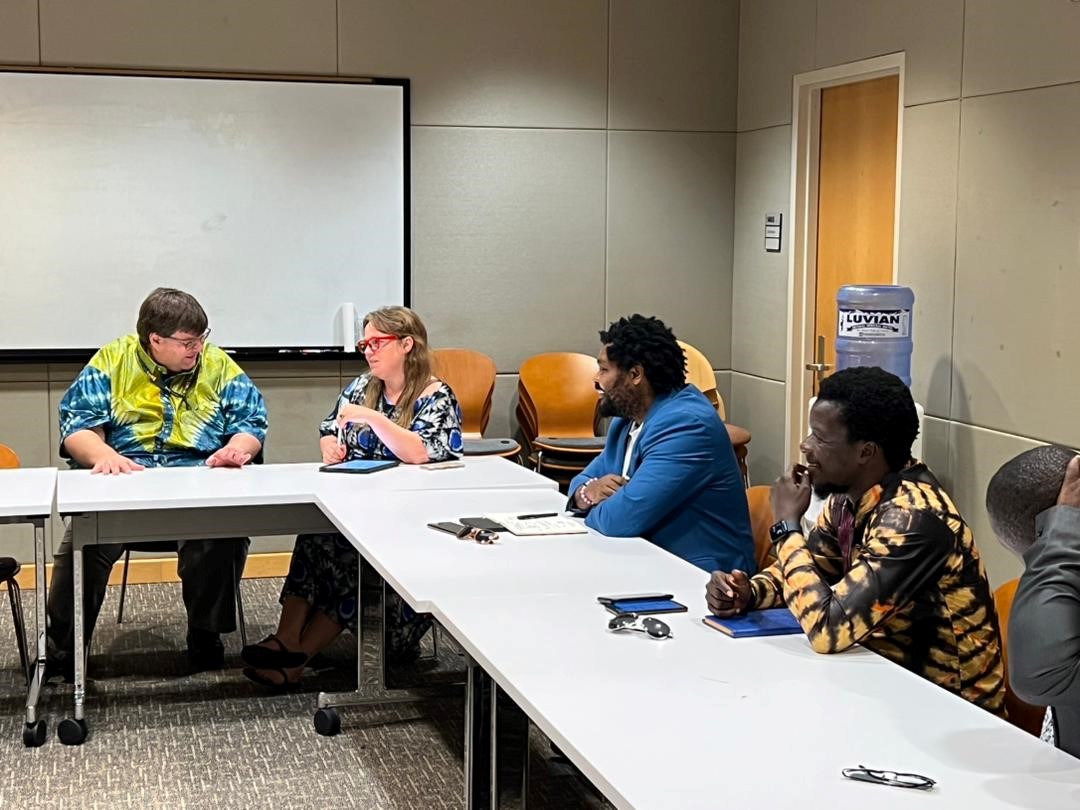The National Executive of the Sierra Leone Association of Journalists (SLAJ) has met with the United States Ambassador Bryan David Hunt in a brief courtesy call at the US Embassy in Freetown.

The discussions centered on the work of SLAJ, and the media landscape in general.
SLAJ President, Ahmed Sahid Nasralla, gave a brief overview of SLAJ and highlighted key successes and challenges in his four years so far as President of the Association. He mentioned the historic repeal of the criminal libel law which he said laid the foundation for most of the development now taking place in the media.
From the establishment of the SLAJ Golden Jubilee Journalism Welfare Fund, the National Fund for Public Interest Media, to the Media Manifesto: The Media We Want, and the SLAJ Gender Equality Policy for the media, and improving relations with the national security forces among others.
Making specific reference to the June 24 2023 national elections, Nasralla talked about training and capacity building for journalists across the country supported by various donors (National Democratic Institute, National Endowment for Democracy, the European Union through IDEA International, Embassy of Ireland, UK Aid-FCDO, and UNDP).
He also highlighted the success story of the I-Verify platform and the NDI SuperNewsRoom in countering disinformation, misinformation, and hate speech during the elections by providing public and civic education and increasing access to credible and factual information about the elections to the public.
However, Nasralla lamented the challenge of media poverty or poverty of the media, which he linked to the fact that there are about 500 registered media outlets in the country, with most of them being one-man businesses in a country and economy as small as Sierra Leone’s.
He stated that media pluralism is a democratic tenet but in the case of Sierra Leone, it is apparently counterproductive and undermining the very essence of the media. He said SLAJ and other industry players have been calling for media outlets to merge, pool resources together, and establish well-structured and properly managed media houses that will be viable with quality personnel and quality output.
Ambassador Hunt was amazed to learn about the number of media outlets in Sierra Leone and encouraged SLAJ to continue to work with industry stakeholders to push for their consolidation.
Here is the Ambassador’s advice to SLAJ on several media issues:
Consolidation of the media: “I think your (SLAJ) push for the consolidation in the media industry is the right one. A country of this size, realistically can probably sustain three or four print media houses. In my view, you might be able to get a few more if you can get people who want to do radio as well as print, and as well as television. You going to have to find a way to push for that salvation. So you encourage members, and owners to think about the true economic viability of the media as a business.
“If I were SLAJ, if I want the media industry to be viable for my members in the long term, I will put a significant emphasis on that, on trying to get a workable number of media houses that have the ability to operate as businesses and employ members of SLAJ. And that is not everyone gets to be an Editor.
Editorship: “That’s true but realistically should everybody be an Editor? Probably not in a country of this size. There is nothing that prevents one from having a very successful career as a journalist. We have very highly paid folks in the US and in many other countries who will simply do investigative reporting who are not owners or editors of media houses. So I think changing the culture that says to be successful in journalism everybody needs to be an editor/media owner is probably something else, if I were SLAJ, I would emphasize and try to change that.
“Frankly, globally, it is not how the media business works. Most people who are journalists aspire to be senior reporting journalists, aspire to be able to have their own calling, their own TV show, or their own broadcast program, but they do not necessarily aspire to own the media/paper.
“Editor is a very specific thing. Editorship is something very different from being a journalist. It is a different skill set. It is a different thing you train for. A journalist doesn’t really aspire to be a copy editor and editor; editors don’t aspire to be investigative journalists. They are two different career paths in the same industry.
Standards: “I think you also have a serious problem with standards in the media. You have identified it in our conversation here. People who are passing editorials as news, advertorials, and paid advertising as news; that is a real issue.
“So I think SLAJ needs to work with the Independent Media Commission to get them to pay attention to that. Not just to hate speech, which is of course inciting violence. But focusing on enforcing those standards in a non-partisan way. So people who are doing these unethical things, taking monies from politicians to write a favorable story and then not identifying it as a paid political advert, are also facing consequences.
“There is nothing wrong with a politician paying for it, nothing wrong with the journalist writing it as long as it is identified as a paid political advert on behalf of the political party or the candidate. It is a matter of truth in journalism.
Safety and Security of Journalists: “The other area I would like SLAJ to pay more attention to is the whole question of the security of journalists, making sure journalists are able to carry out their craft free from harassment, intimidation, and violence.
Making media viable proposition: “How we can make the media a viable business proposition rather than 500 different media outlets, how do you sustain that in a country and economy this small? It really does undercuts the media as an influential part of Civil Society in the political process. If it is so fragmented that, at most a few thousand people are seeing what is being written and what they are hearing and what is being said, it is not really playing its role as the 4th Estate, the proverbial 4th Estate of the Realm. So we want to find a way to be able to help you out with that.
Inclusion: “Across the board, the US government programs, part of our instructions from Washington are to make sure that we are doing things in a way that we are specifically reaching out and trying to target historically disadvantaged communities. So, certainly in our journalism work, given that women have been historically disadvantaged in the profession, we certainly want to try to make sure that women are part of all of the programs that we are doing, and that they are receiving the same benefits as their male colleagues. And that cuts across all historically disadvantaged communities. So we are charged as part of the policy of the US government to make certain that we are reaching out to all historically disadvantaged communities. We are trying to be very intentional about that. And Gender is one aspect of it.”

